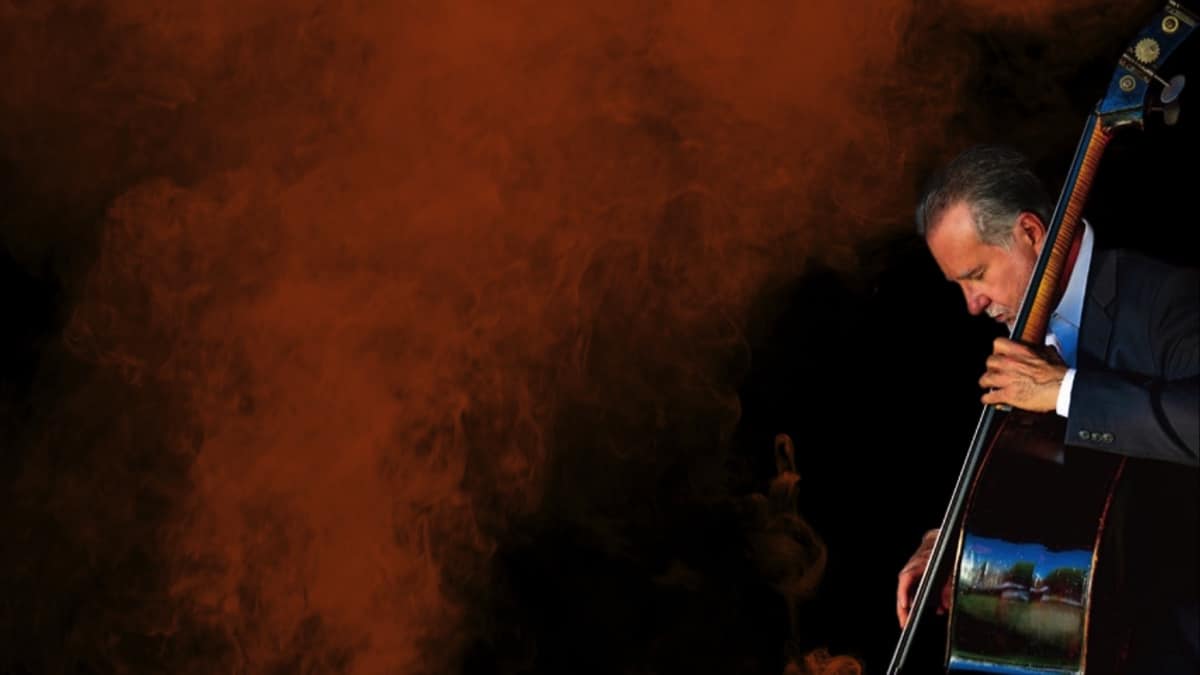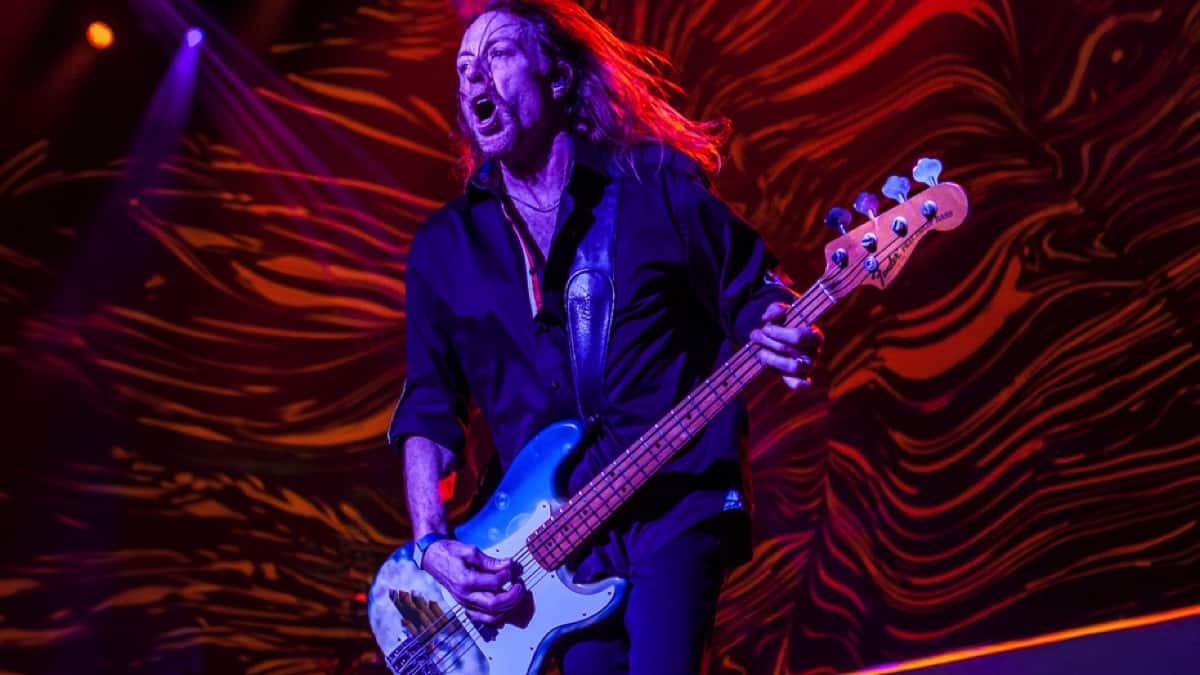Cover
Bass Musician Magazine: Dec/Jan 2009-2010 Issue Featuring Christian McBride

Jake: Speaking about the music on Kind of Brown, the vibe of the CD is definitely straight ahead, but I also heard a bit of blues and funk in the mix. Would it be fair to say that combination of musical elements is pretty much where you live?
Christian: Absolutely! I’ve been fortunate enough that I feel I can live in a lot of different musical places. I enjoy any music that has a fat groove to it. I don’t care what kind of groove it is. It could be some kind of Latin groove, it could be a reggae groove, it could be straight ahead swinging, and it could be funk, whatever. I just need some pocket. In this particular instance that was the straight ahead pocket.
Jake: I guess I want to say that with the mix of musical elements you’ve been talking about, and probably covered, I assume the people at the Village Vanguard were still OK with your presentation?
Christian: The gig at the Vanguard went extremely well, and everybody was happy. We just concluded an engagement at the Vanguard Sunday night. I would have to say that the Vanguard is Inside Straights official home.
Jake: Do you see a lot of bands in New York employing this mixture of elements and genres we’ve been speaking of, as well as those involved in the straight ahead scene?
Christian: I think there’s a pretty healthy mixture of everything going on. There are some players in New York like Eric Alexander, Mike Ledon, and Eric Reed that keep things happening. Eric Reed no longer lives in New York but is there quite a bit of the time. Then there are guys playing at Smalls and Fat Cats that are doing more experimental types of things. I think there’s always going to be a good healthy dose of everything as far as the jazz scene in New York goes.
Jake: What do you see happening with the younger players in New York?
Christian: All of the younger cats who I see coming on the scene kind of represent a healthy mixture of everybody trying to do their own music. I see a lot of different reactions on this particular topic. You’ll get one group of musicians that will say these guys are just trying to write their tunes, and they’re not looking into the tradition, the meat and potatoes of where this came from. But for me, it’s all about balance. I don’t mind some of these younger guys working on their music as long as they can keep a balance of learning the standards, really learning how to swing, really learning the language of the tradition. Then, when you make your own music you’ll have all that other stuff to fuel it. It seems like too many times people are trying to make their own music in a vacuum… why do I need to listen to the old stuff when I can just make my music as it stands, with my own sound. But one of my favorite sayings that I’ve heard is, the only thing new is the history that you don’t know. So when I hear guys talking about trying to make their own music, make their own sound, quote unquote trying to find my own thing, people already have their own thing, you don’t really need to try to develop that. I guess that’s a long way of saying that I think there’s a group of young cats on the scene now that are really keeping that balance.
Jake: A while back, I did an interview with Esperanza Spaulding, a definite young lion, and she commented on how she was not interested in transcribing the works of the past greats, she was more concerned with trying to understand where they were at when they were playing and recording their music.
Christian: You know, everything is fueled by your surroundings and what’s going on in the world at that time… that’s what history is. The study of not just what happened, but what fueled it to happen. It seems that too many times when guys are studying to be able to play traditional jazz, they don’t know that they’re doing it, but their approaching it from a classical standpoint. You have to play something just like they played it, or it’s not authentic. That’s what classical musicians do. It’s OK if you want to do that, but you need to recognize that that’s what you’re doing. I do think that in order to be a jazz musician, and not even a great jazz musician, just a good jazz musician, you do need to study all of that stuff that happened before you—as much as you can. You could spend your whole life studying the tradition and the history, listening to Paul Chambers and Ray brown, and Ron Carter and Jaco—you could definitely spend your whole life doing that. But nobody “should’ do that. Just really study it enough so you can understand, just like Esperanza was saying, where they were at—so you can understand what fueled that greatness. Not to just do it like them, but just so you can understand what it takes to move on to that next level. Don’t worry about what you’re hearing, just play what you feel. Most players that we’ve given that mythological status, like Bird and Coltrane, and Miles and Herbie, made it obvious from their recordings and obvious from their interviews that they weren’t actively or consciously trying to be innovators. There’s this over-idealism that we always have to go out and find the lost chord or try to find new things that nobody has done before. The people that did find ways to do things that hadn’t been done before just did it because it was a natural evolution for them.
When you think about a guy like Tony Williams, as much as an innovator as he was, his response to being an innovator would have been that’s nothing but my interpretation of what I heard Philly Joe and Roy Haynes and Max Roach doing…I studied all those cats like you younger guys do. He wasn’t one of those guys that consciously said, oh my god; I’ve got to come up with something new. You know, Max, and Philly Joe, and Elvin played everything, and Tony didn’t go, I’ve got to find my own thing, he would just say, play what you hear.
Bass Videos
Brian Bromberg, Paying Tribute to Scott LaFaro, April 2024

Brian Bromberg, Paying Tribute to Scott LaFaro, April 2024…

Brian Bromberg is one heavy-hitting bass player and I am in awe of his talent as one of the few individuals who is equally proficient on electric and upright bass.
You might remember our conversation back in 2018 when he released his powerhouse Funk album. Brian’s “A Little Driving Music” album is a staple on all our road trips and his Jaco and Jimi Hendrix tribute albums are mind-blowing… and I could go on and on.
Now, Brian has taken on the arduous task of producing an album paying tribute to the late, great, Scott LaFaro. He teamed up with pianist Tom Zink and drummer Charles Ruggiero and Brian delivers a commanding performance on upright. The entire album is a masterpiece and a real treat to listen to track after track.
Join us as Brian shares the details behind this project and more.
Photo, Michel Bocandé
Featured Videos
Visit Online
brianbromberg.net
FB @BrianBrombergBassist
YouTube
Cover
Leland Sklar, Over Half a Century of Bass, March 2024

We all have enjoyed Leland Sklar’s Bass lines for over half a century.

You might remember that we had him on our cover back in 2017 and did an update when he launched his book “Everybody Loves Me” in 2020. It was exciting to hear that The Immediate Family had got back together in the studio to work on their own music in 2019 and are now up to two albums.
Just last December, Magnolia Pictures released a documentary titled “Immediate Family” where we got a behind-the-scenes look at the massive contributions Danny Kortchmar, Waddy Wachtel, Ross Kunckle, Leland Sklar and Steve Postell have made in countless songs that are the very essence of our daily personal musical soundtracks. Seeing the astronomical roster of performers they have supported over many years is very eye-opening. It is a must-see for any music lover!
Now, I am thrilled to bring you a special chat with Leland Sklar where we go more in-depth into the bass side of his musical journey.
Photos: Header, Rob Shanahan – Cover Photo, Jay Gilbert/Chris Schmitt
Featured Videos:
Skin In the Game – https://www.youtube.com/watch?v=QhbnzIrdjJ8
from new album Skin In The Game
The Toughest Girl In Town – https://www.youtube.com/watch?v=UVQLZIRfLjU
from new album Skin In The Game
Fair Warning – https://www.youtube.com/watch?v=1DN18DYwLsU –
from the self-titled album The Immediate Family
Visit Online
www.immediatefamilyband.com/
www.facebook.com/TheImmedFamily
www.instagram.com/theimmedfamily/
Bass Videos
Ricky Phillips, STYX Bass And More – February 2024

Ricky Phillips, STYX Bass And More…

I have always been a huge Styx fan. Their music kept me awake during countless nights studying and gave my imagination a place to escape when I had a moment to take a break.
I had the immense opportunity to chat with STYX bassist Ricky Phillips for our August Cover in 2017 and follow his projects as time passed. Now, I am thrilled to have the opportunity to catch up with Ricky as he has been super-busy over the past six years.
Join me as we take a deep dive into the band’s most recent album “Crash the Crown” and EP “The Same Stardust”. Ricky shares some insights into the herculean team effort behind the scenes and the musical process that keeps them ever so busy and how he has updated his sound.
Without further ado… Here is Ricky Phillips!
Photo: Jason Powell
Featured Videos:
“Crash of the Crown” lyric video
“Reveries” lyric video
“Save Us From Ourselves” lyric video
“Sound the Alarm” lyric video
“Too Much Time On My Hands” Zoom video 2020
Visit online:
www.Styxworld.com
FB & IG @styxtheband
Bass Videos
Jeff Pilson, Foreigner Low End – January 2024

Jeff Pilson, Foreigner Low End – January 2024…

Those of us who were around back in the 70’s remember how certain songs on the radio resonated with us. It turns out that many of these iconic melodies came from Foreigner and they were part of our personal soundtracks!
After all these years, the band is going as strong as ever with Jeff Pilson firing away on bass midstream into a 2-year farewell tour.
I am excited to be able to bring you all the details about Jeff’s musical Journey, the farewell tour in progress, how he gets his sound and his plans for the future.
Cover Photo: Krishta Abruzziini / Video Photos: Krishta Abruzzini, Karsten Staiger, Gina Hyams
Featured Videos
For more news on FOREIGNER and upcoming Farewell Tour dates, fans can visit:
foreigneronline.com
facebook.com/Foreigner
twitter.com/ForeignerMusic
instagram.com/foreignerlive
youtube.com/user/FWebTeam
Also on FB @officialjeffpilson
Bass Videos
Rodney O’Quinn, Rockin’ Hard Through the Years – December 2023

Interview With Foghat Bassist Rodney O’Quinn…

Many rock fans have enjoyed music by Foghat, who originally formed in London back in 1971.
Over the many decades of playing, the band members have changed, leaving behind only Roger Earl as the only original member. Bassist Rodney O’Quinn left the Pat Travers Band and joined the group in 2015 and has been laying down the low end for this iconic quartet keeping the Foghat legacy alive. With a new album titled “Sonic Mojo” which dropped on November 10th, the band is as busy as ever and there is lots of very tasty music to come.
Join me as we learn of Rodney O’Quinn’s musical journey, how he gets his sound, and his plans for the future.
Photos:
Cover, Jake Coughlin
Video Thumbnail, Tom Apathy
Photos used in the video: Kerry Quinn, Chuck Lanza, Kim Granger, Kenneth Strohm, Jake Coughlin, Jay Jylika
Featured Videos:
1st Single from Sonic Mojo – Official “Drivin’ On”
2nd Single from Sonic Mojo – “She’s a Little Bit of Everything Official Video
“Road Fever”- California Mid State Fair – Paso Robles, CA – 7-27-22
“Stone Blue” – Rodney O’Quinn Bass/Lead Vocals – Don Odell’s Legends – Woonsocket, R.I – 10/15/22 – The Stadium Theater
The Earl’s Court – Season 2, Episode 7: Funny Guys
“I Just Want to Make Love to You” – CasinoRama – 6-9-23
FOGHAT “Somebody’s Been Sleepin’ in My Bed” – Mohegan Sun, Uncasville, CT – 1/28/22
“I Just Want to Make Love to You” – California Mid State Fair – Paso Robles, CA – 7-27-22
Visit Online:
www.foghat.com
www.facebook.com/Foghat
www.twitter.com/FOGHAT
www.instagram.com/foghat_official
www.youtube.com/user/FOGHATMUSIC


















